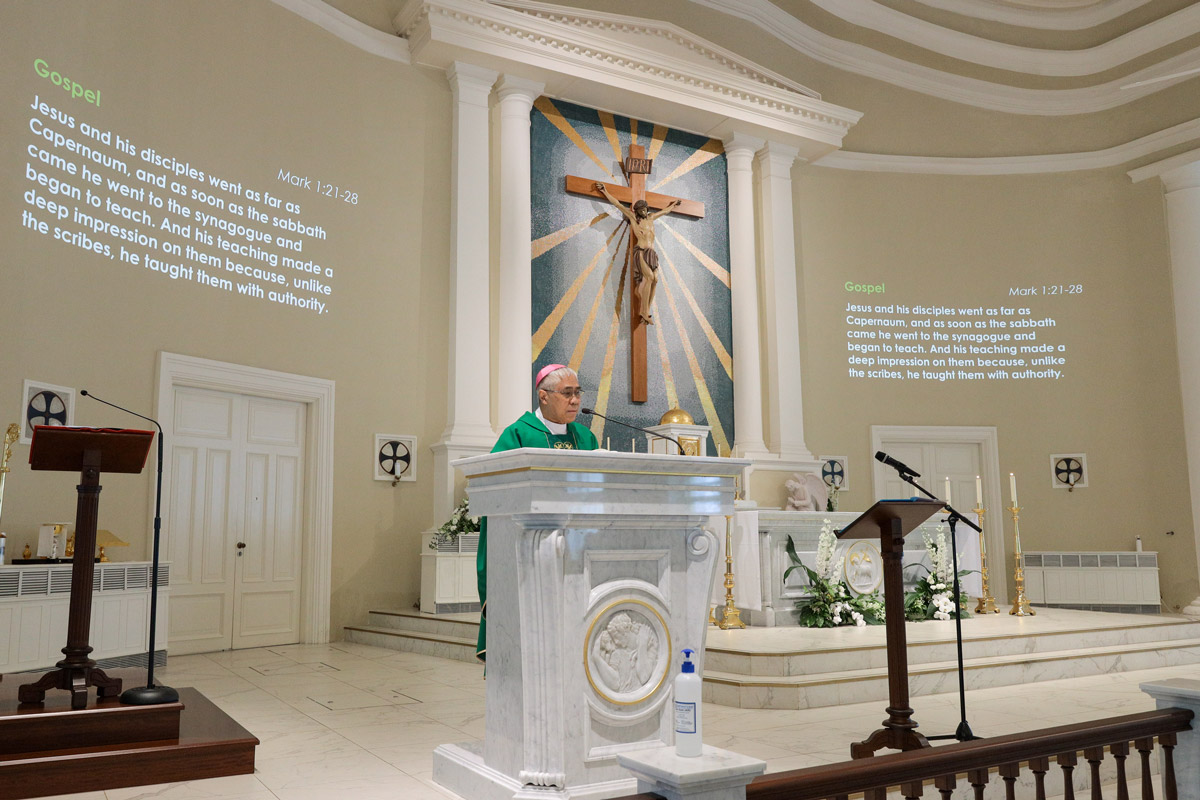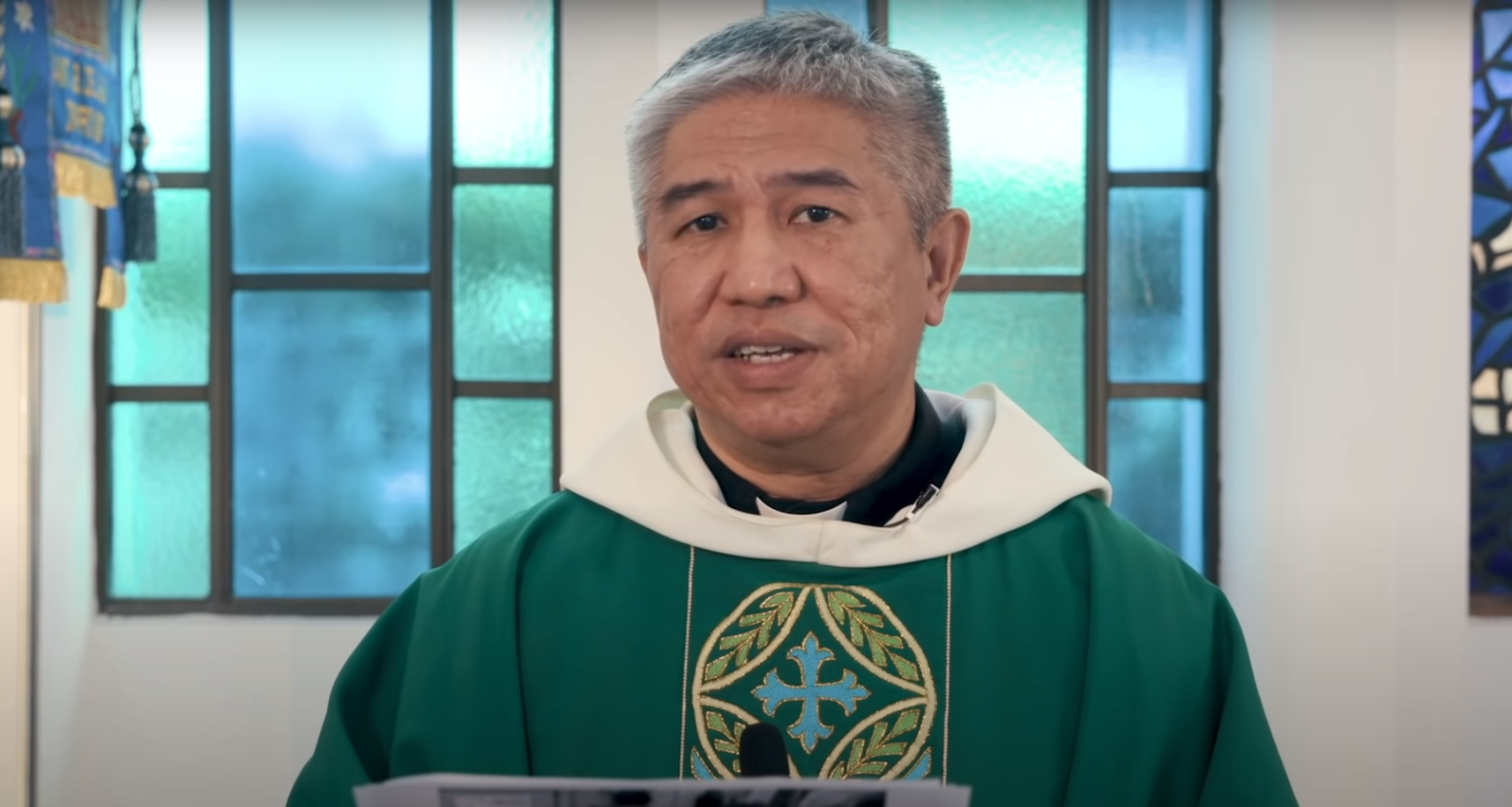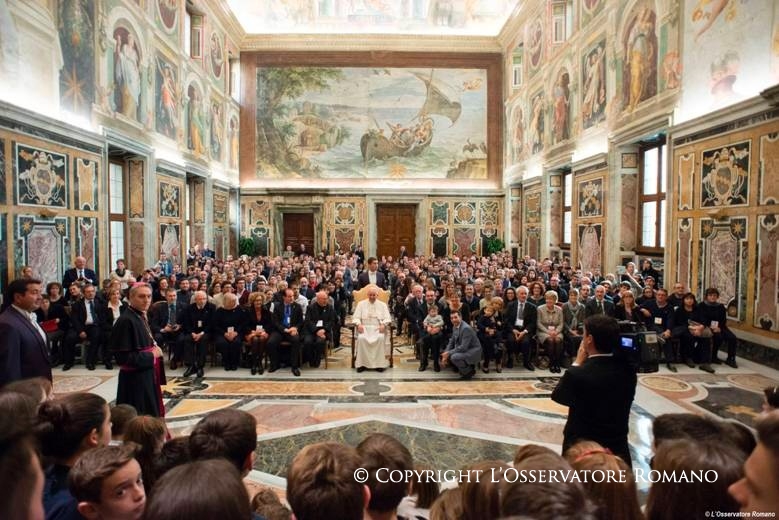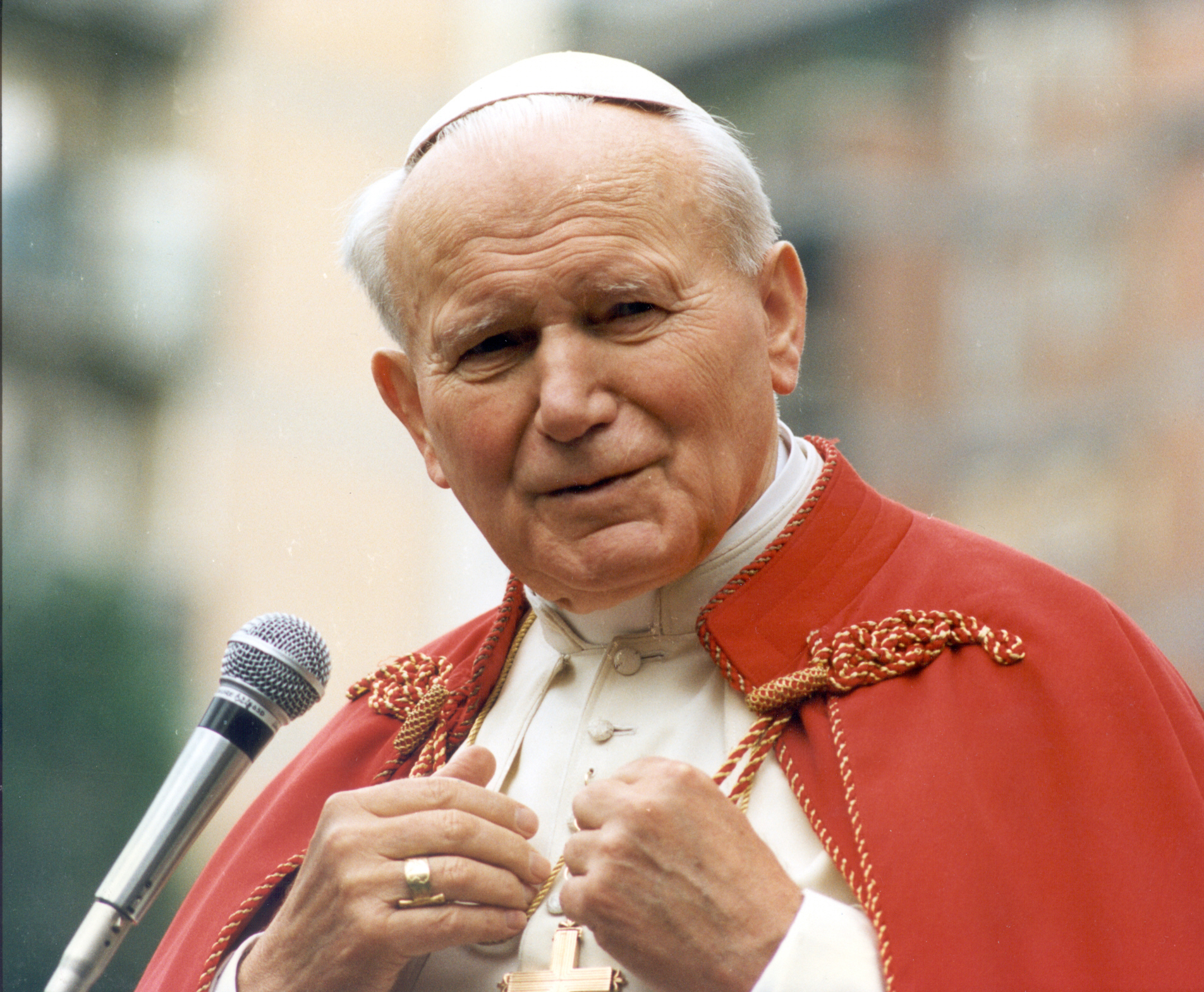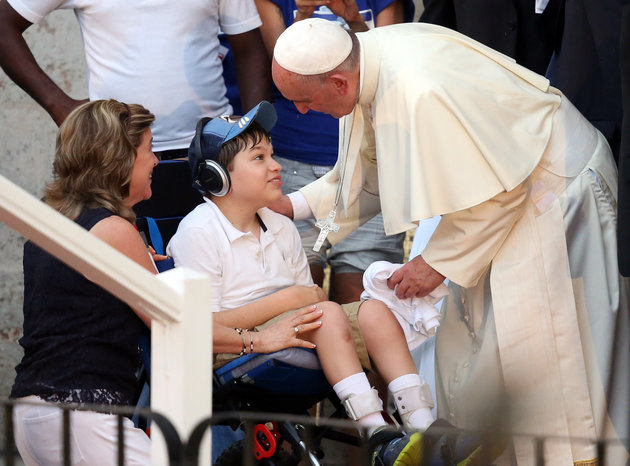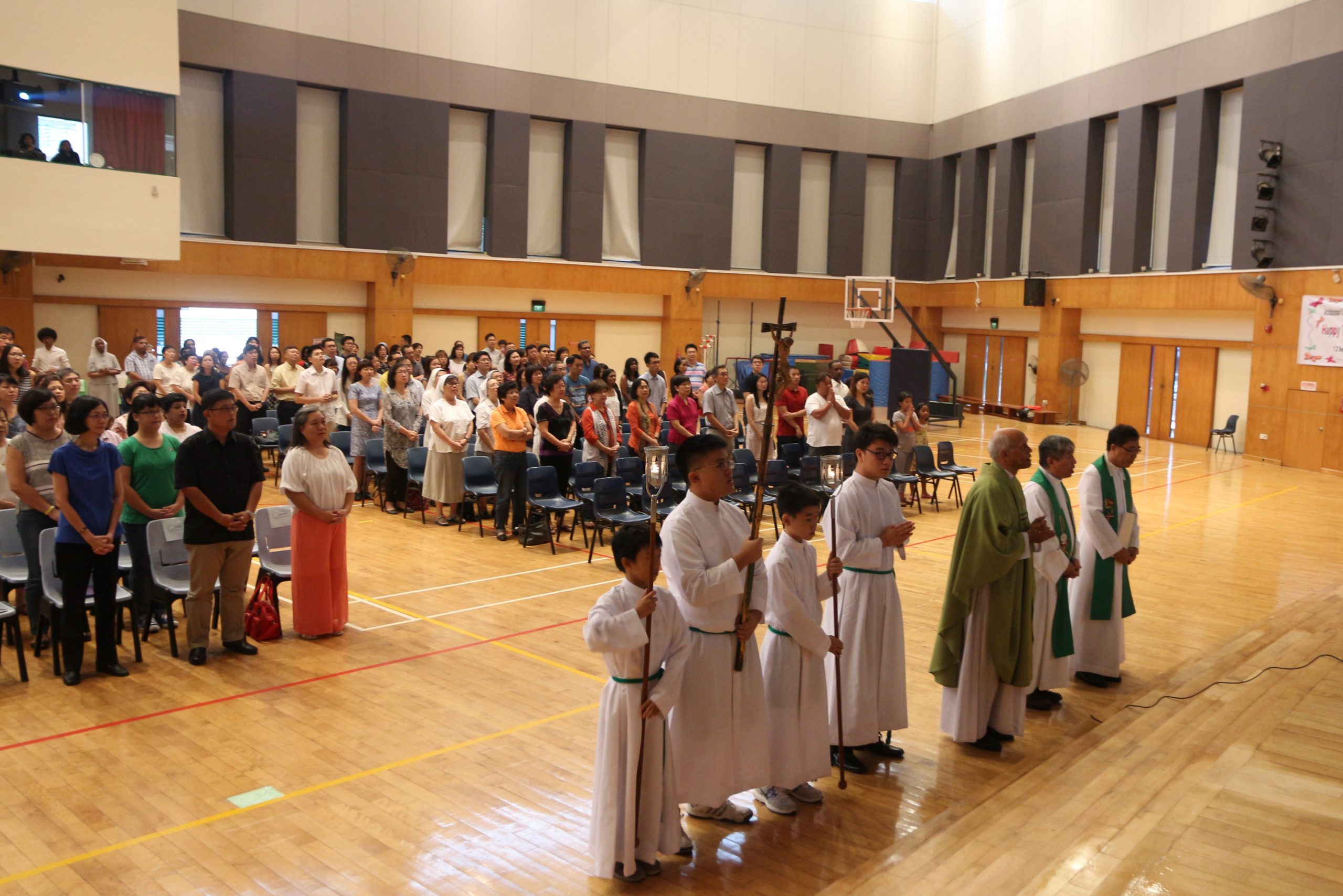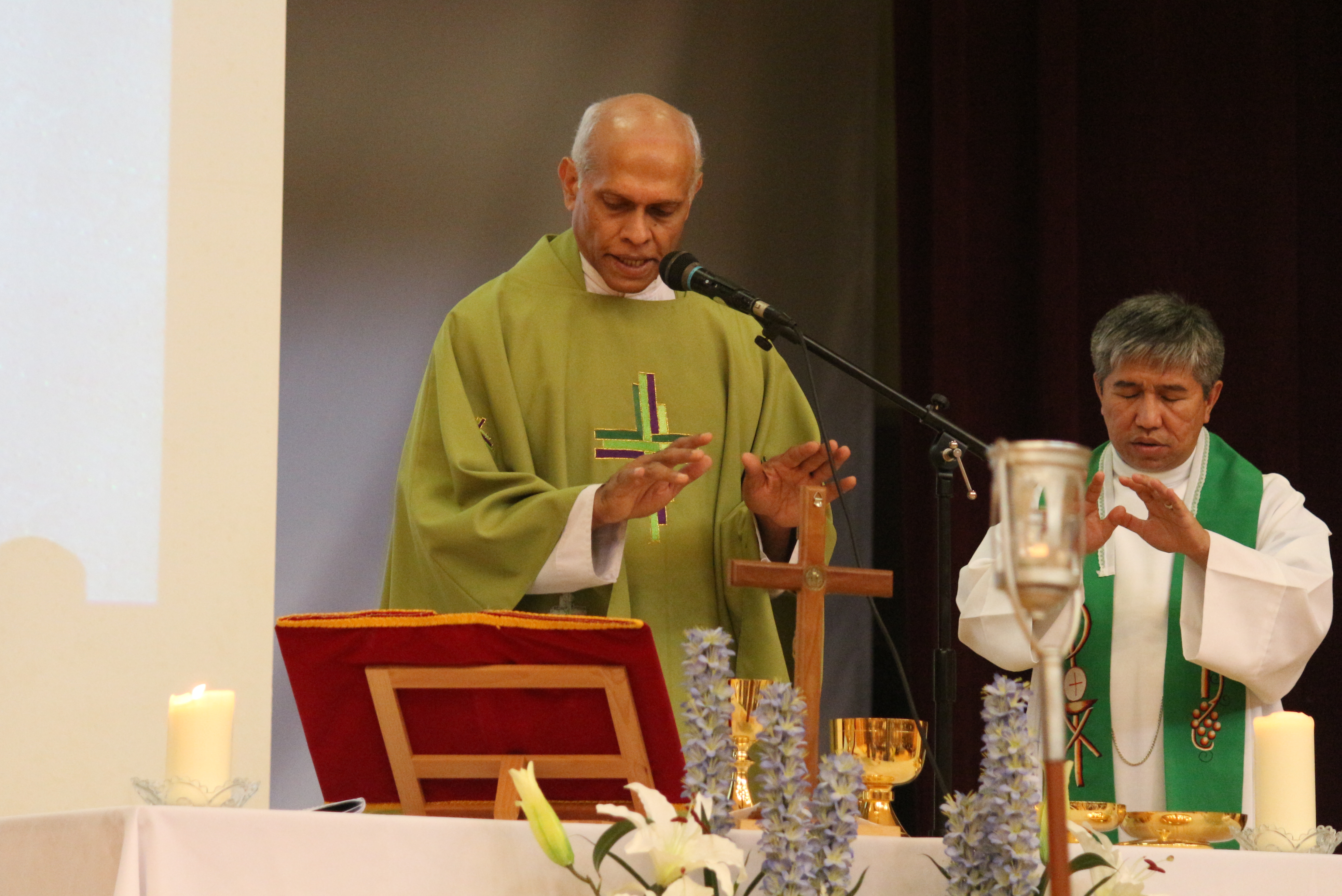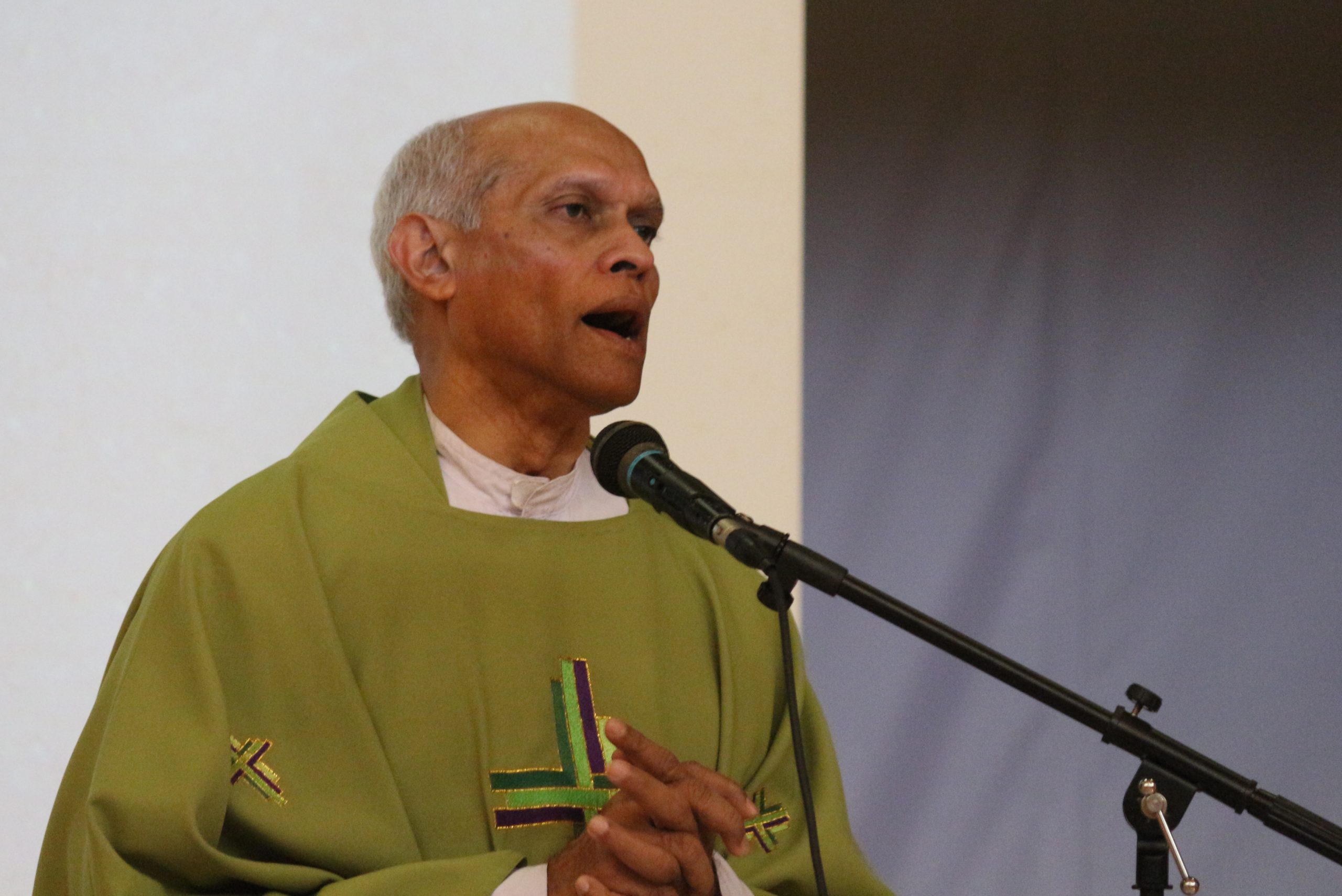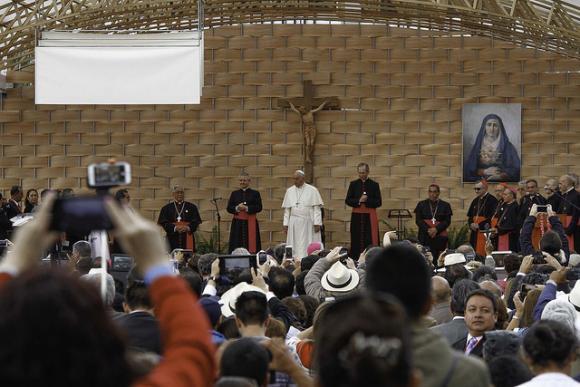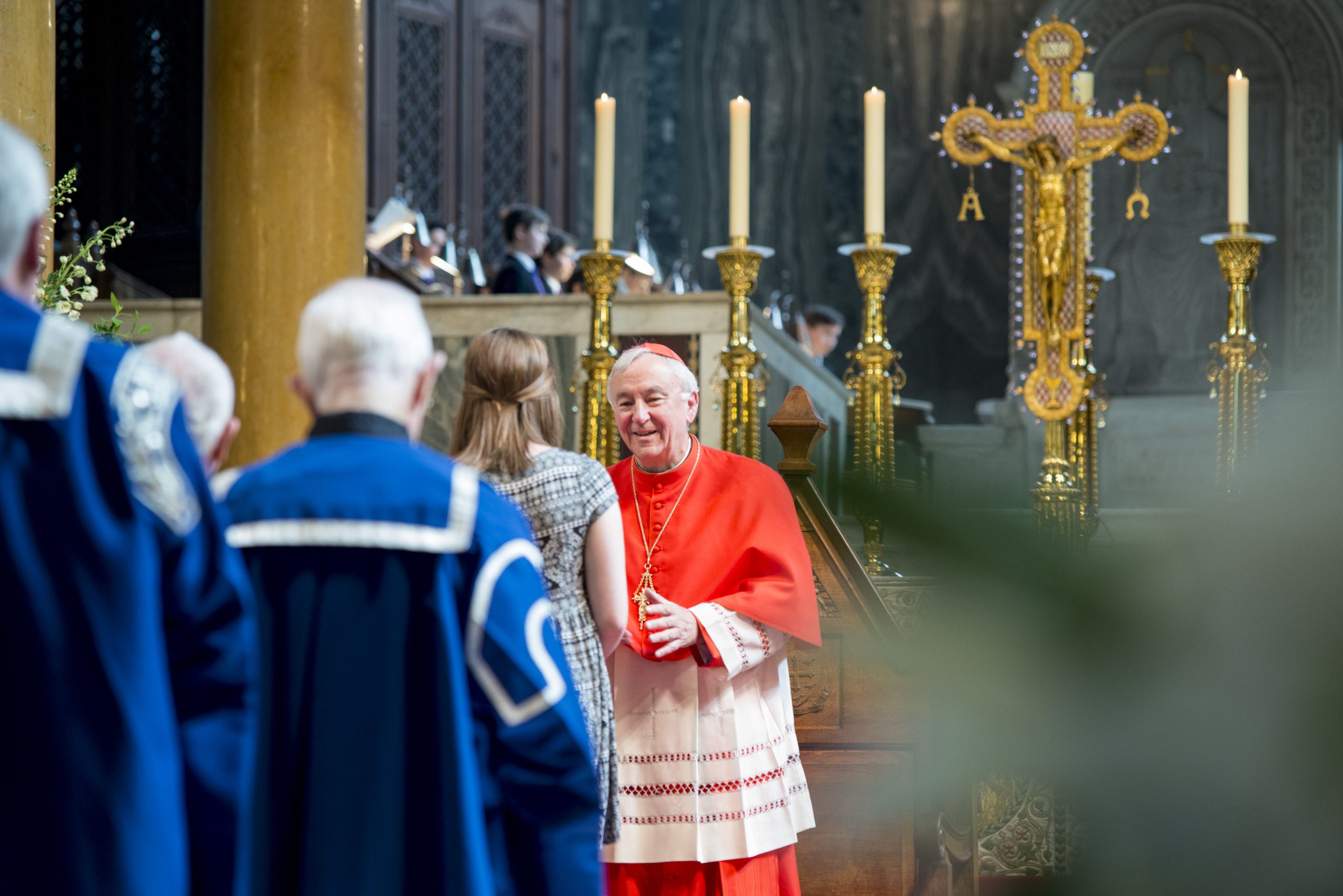Here is the homily of his grace Archbishop William Goh at the Holy Mass commemorating the Commencement of the School Year, as well as the commissioning of 11 new principals.
My dear brothers and sisters in Christ, as educators, all of us are called to be leaders, not just in imparting knowledge, but to be educators of life, of love and of truth. We need to do this with authority. But what kind of authority needs to be exercised, so that this authority of instructing—of teaching—would be effective?
In today’s Gospel reading (Mark 1:21-28), we are told that Jesus went to the synagogue and began to teach. His teaching [leaves] a deep impression on [those who hear Him] because, unlike the scribes, He taught with authority.
What is this authority? Most of us we tend to rely on our juridical authority, because we are principals, because we are bishops, because we are priests. Juridical authority is not a very effective mean to form people and to get things done. In fact, if we have to use juridical authority, it can be a sign of bankruptcy in leadership. Some of us use our professional authority, our academic authority; we like to show our string of degrees and credentials, so people will believe what we say, what we teach.
Of course, juridical and professional authority have importance, especially when people do not yet know us. But, my dear brothers and sisters, at the end of the day, it would not be your juridical or professional authority that would make you an effective leader educator. It is ‘personal authority’ that will bring the two together. Without this ‘personal’ authority we will end up as inept, ineffective leaders.
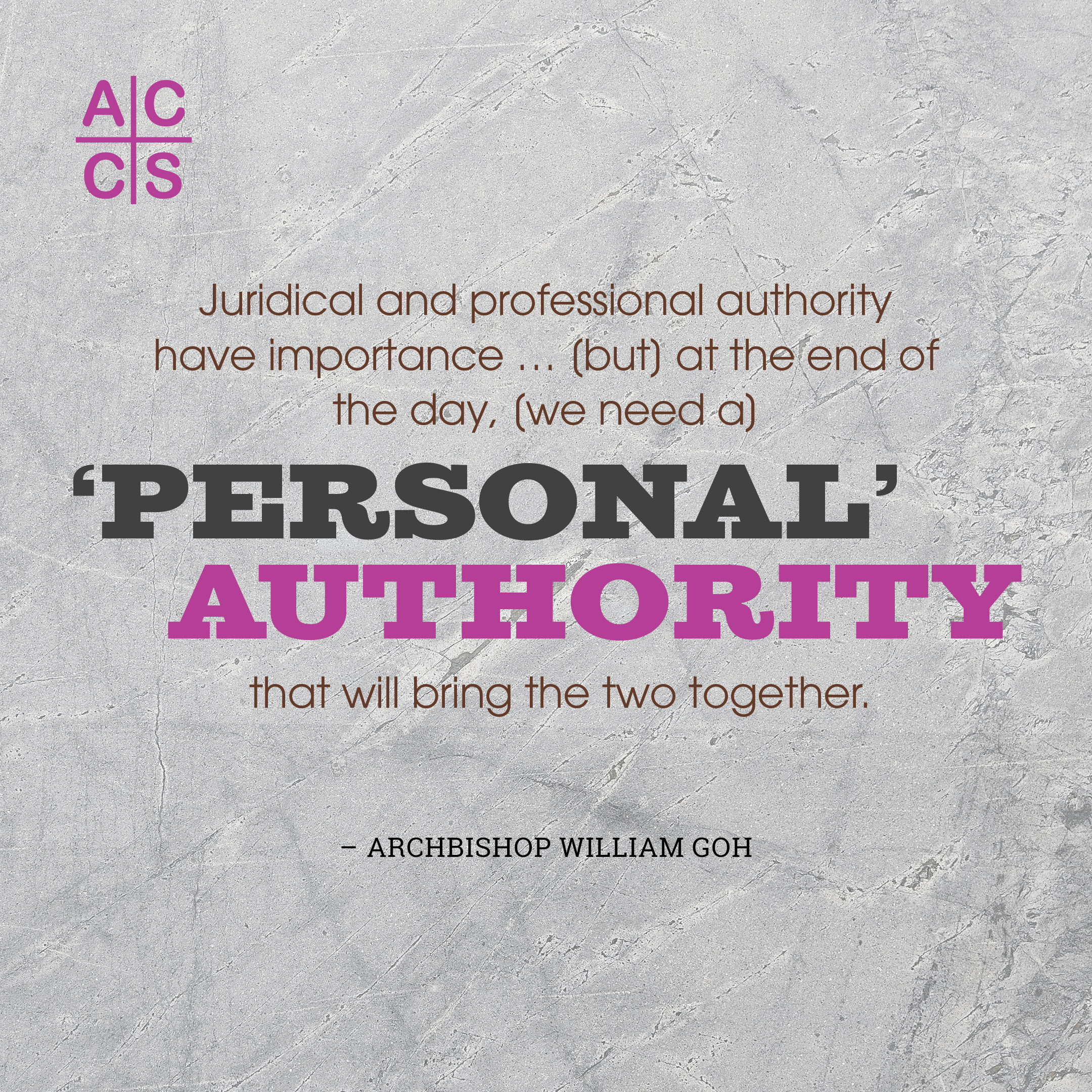
This was the situation of the scribes in today’s Gospel. The scribes were professional rabbi, professional teachers. They went to theological schools, they knew all the laws, they were the official interpreter of the laws—and there were 613 of them. [The scribes] were deeply schooled in the commandments, and yet, we are told Jesus taught differently from them; “unlike the scribes” (Mk 1:22). These did not teach with authority, [for] the only authority they had was juridical authority and professional authority; they lacked ‘personal authority’, because what they taught was not how they lived. What they taught was not relevant to the lives of the people, they were just abstract knowledge and laws that did not give the people life, that did not lead them to the truth.
Educators can fall into the same threat. To be a good educator, it is not enough to acquire professional knowledge of whatever subjects we are teaching. Of course, that is important! But unless a teacher—an educator—truly believes in what he or she is teaching, truly interiorises his or her knowledge, he would not be able to teach with passion and conviction; it would just be imparting knowledge, but not [himself].
What is it that changes people’s lives? It’s not just what we say, [but also] how we say it, and how we integrate it into the way we look at the world, the way we look at situations, the way we look at life. Whether you’re teaching geography, history, or mathematics, they have to do with life.
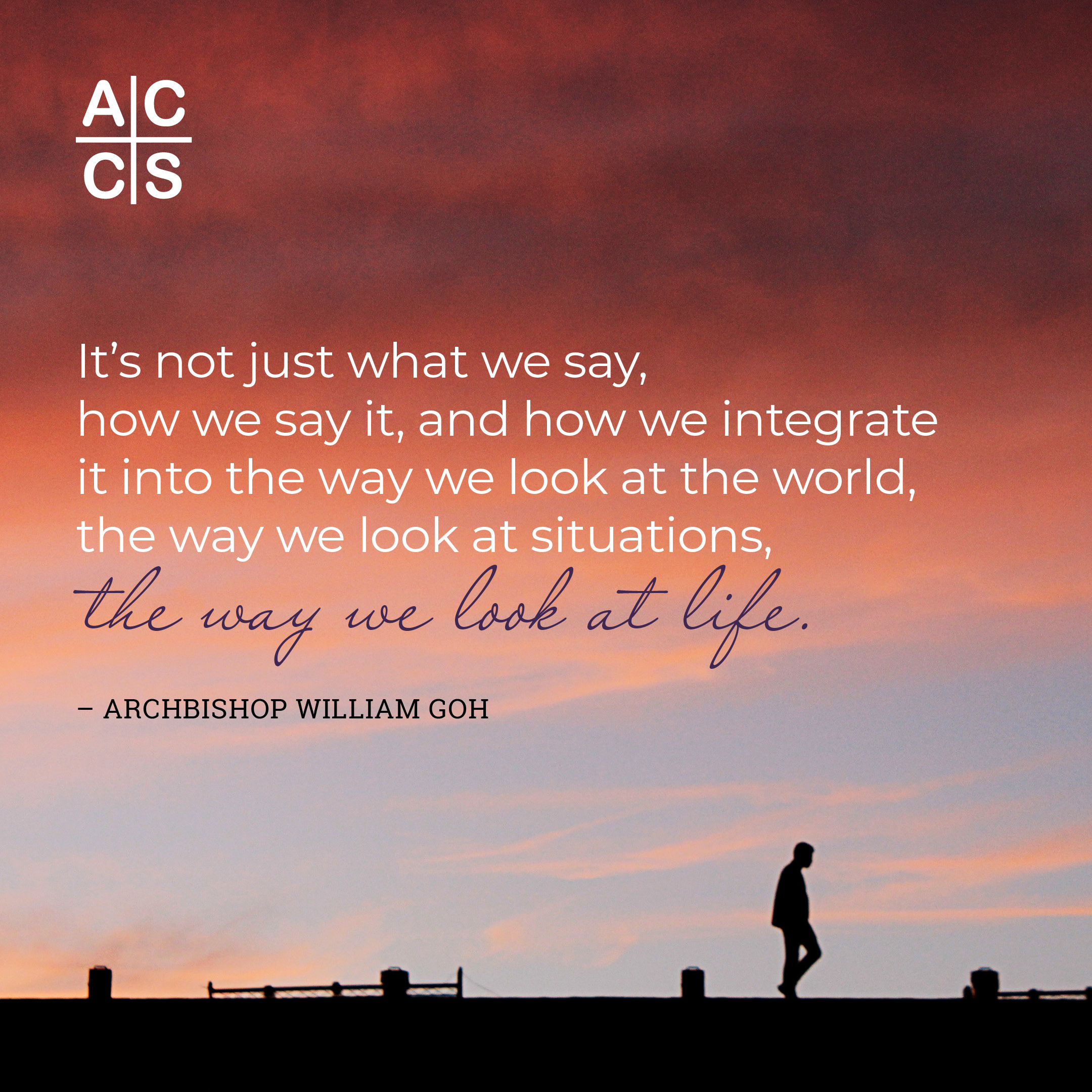 We cannot teach them as if they are just dry subjects; they are not. [This is] why a Catholic school does not mean that we have all these academic subjects, and—over and above all these—we have another optional subject called “Religious Knowledge”. Rather, if a teacher is imbued with the Gospel, and is convinced that what he is teaching has great importance in the lives of our students and of future generations, he would, in a very subtle or unconscious way, inject the values of the Gospel, his convictions, her convictions, into what she is teaching. That is what it means to be a Catholic school: Catholic in the way we look at life, [Catholic] in the values that we are offering.
We cannot teach them as if they are just dry subjects; they are not. [This is] why a Catholic school does not mean that we have all these academic subjects, and—over and above all these—we have another optional subject called “Religious Knowledge”. Rather, if a teacher is imbued with the Gospel, and is convinced that what he is teaching has great importance in the lives of our students and of future generations, he would, in a very subtle or unconscious way, inject the values of the Gospel, his convictions, her convictions, into what she is teaching. That is what it means to be a Catholic school: Catholic in the way we look at life, [Catholic] in the values that we are offering.
My dear brothers and sisters, to teach with authority, therefore, requires us that we teach with this ‘personal authority’.
In the first reading from the book of Deuteronomy (18:15-20), we see Moses, who gave the same laws to the people. But Moses was highly respected. The people did not always obey the laws, that is true, because of their weakness, but they respected him. Why? Because Moses was not just a friend of God, he was a man of God. They saw him as someone who was infused with the presence of God, not by what he thought, not by what he said, but by how he lived.
The Book of Exodus told us that Moses, he spoke to God “face to face”, as a friend (33:11). Moses was the one who journeyed with the people 40 years in the desert. Moses was the one who interceded for them whenever things went wrong, and God wanted to punish them. Moses was the one who fed them with manna in the desert when they were hungry, gave them water from the rock when they were thirsty. Moses was the one who was always with them, every step in their journey; he was living among them. That was how Moses was different from the scribes and that was how Jesus lived his life as a teacher.
 Interestingly, in the Gospel, Jesus is portrayed as the second Moses, the new Moses, the real Moses. That is why the life of Jesus paralleled the life of Moses. Like Moses, Jesus was persecuted by the king. Like Moses, He fled to Egypt. Like Moses, He went up the mountain and He gave them the new law—at the sermon on the mount—the beatitudes. Like Moses, He gave them the new manna, the bread of life. Like Moses, Jesus, in John’s Gospel, is the living water (John 4:14).
Interestingly, in the Gospel, Jesus is portrayed as the second Moses, the new Moses, the real Moses. That is why the life of Jesus paralleled the life of Moses. Like Moses, Jesus was persecuted by the king. Like Moses, He fled to Egypt. Like Moses, He went up the mountain and He gave them the new law—at the sermon on the mount—the beatitudes. Like Moses, He gave them the new manna, the bread of life. Like Moses, Jesus, in John’s Gospel, is the living water (John 4:14).
Jesus was one person who went about living with the people, healing the sick, carrying their sins and infirmities in his body. He was one with them. He knew the hunger, the thirst, the sufferings of the people that He ministered to. That was the reason why Jesus preached “with authority”, authority that they had never seen before.
In the Gospel [last week], when Jesus said to the disciples, “follow me” (Mark 1:17) and immediately they dropped their nets; they left their boats—Peter, Andrew, James and John—because it was a divine command. Jesus never asked, “would you like to follow me?”. “Follow me”! And they saw in Jesus the divine presence; this is why they followed Him.
Into today’s Gospel, even the evil spirit recognised the divine presence in Jesus. Jesus was only teaching in the synagogue. He was not trying to exorcise anybody! It was the devil who said, “You are the Son of God, the Holy One of God”, because they could not withstand His divine presence, that was the kind of authority that exuded from Jesus.
This is our challenge today: would our students, would our staff, see us a man and woman of authority? Not by what we say, but by our very presence. [This] is very important [for] educators and leaders, because in the final analysis, a true prophet is not so much seen by his teaching, is by his way of life: walking the talk, showing the way, being true to what we believe in.
That’s why, if you as an educator, are not convinced of what you are doing, you are in the wrong job. Don’t stay. Don’t waste people’s time, don’t waste your time. It’ll be a chore. You will be a burden. You must live and breathe this vocation that the Lord has given to you. You must be utterly convinced that what you are doing will make a difference in the lives of many people, and you will be excited, you’ll be passionate, you’ll be enthusiastic, and you’ll give hope to those being taught by you.
‘Leadership’ is the authority of bringing the people together: looking after your staff, caring for your staff [and] students. Everybody needs ongoing formation. Everybody needs to be reassured. Everybody needs to be encouraged. This is what educators are for: to give encouragement [and] hope.
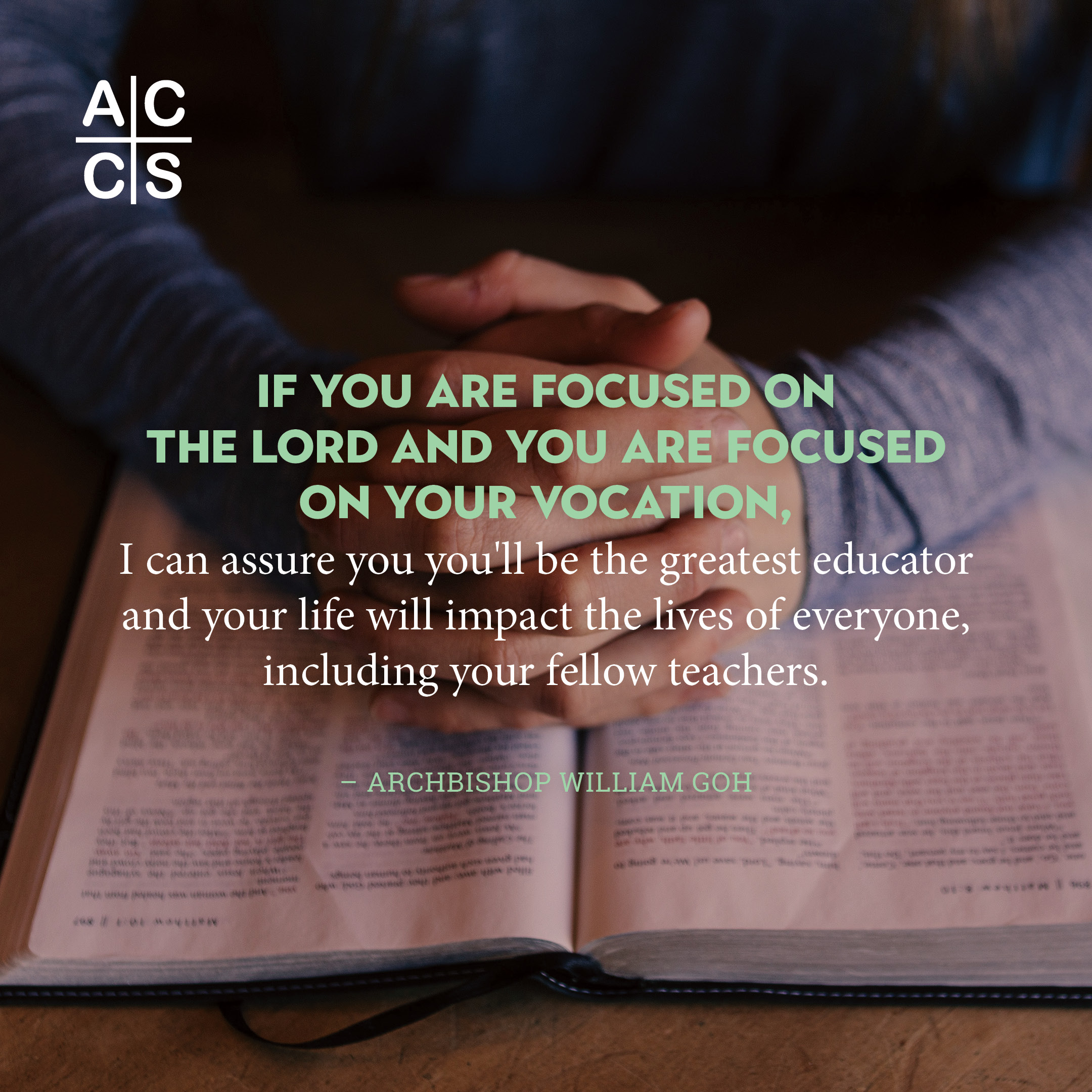 And so, my dear Principals, Vice Principals, educators at large, I urge you: let us pray that we be focused on the Lord, as St Paul asks of us (1 Cor 7:35). When he talks about marriage, it’s not [just] about marriage, about singlehood, [but] about having undivided attention to the Lord, and to our vocation. If you are focused on the Lord, and if you are focused on your vocation, I assure you: you’ll be the greatest educator, and your life will impact the lives of everyone, including your fellow teachers. This is my prayer for you all, and I know: you will live up to your calling. Amen.
And so, my dear Principals, Vice Principals, educators at large, I urge you: let us pray that we be focused on the Lord, as St Paul asks of us (1 Cor 7:35). When he talks about marriage, it’s not [just] about marriage, about singlehood, [but] about having undivided attention to the Lord, and to our vocation. If you are focused on the Lord, and if you are focused on your vocation, I assure you: you’ll be the greatest educator, and your life will impact the lives of everyone, including your fellow teachers. This is my prayer for you all, and I know: you will live up to your calling. Amen.
